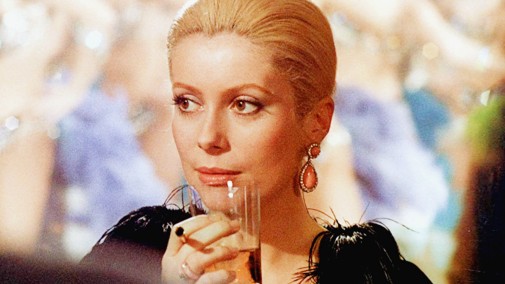
Catherine Deneuve is one of the most beautiful people to ever step in front of a camera. Since the 60s, she has dazzled moviegoers in projects that span from conventional fare to the craziest experiments. While it's true she may not be a performer of astounding tonal flexibility or chameleonic aptitude, many directors have known how to utilize Deneuve's ice queen persona to great effect. Demy made her into a paragon of youthful romance, Buñuel captured a dangerous masochism in her eye, Polanski made her sing rhapsodies of madness while Téchiné gave Deneuve opportunity to modulate her expression into painful naturalism. She is a muse to many an auteur and it's easy to see why – her face must have been made for the big screen by the cinema gods.
If you want to peruse her cinematic glories, The Criterion Channel is currently streaming a marvelous collection of 16 Deneuve films. Here are five highlights from the collection…

THE UMBRELLAS OF CHERBOURG (1964)
Demy's magnum opus is a candy-colored musical that turned Deneuve into an international star and has influenced generations of filmmakers. It tells the doomed romance of a pair of youths separated by war while they sing to the tune of Michel Legrand's melodies. It's a love letter to the musicals of Old Hollywood that also knows how to deconstruct their artifice, celebrating film magic while cannibalizing it at the same time. The end is of particular brilliance when the characters accept their fate like mature adults while the film's formal mechanisms insist on exploding into rhapsodies of emotion. It's a gesture both heartbreaking and sobering, a song about the marvels of young love that understands that the beauty of teenage folly lies in its ephemerous nature.

BELLE DE JOUR (1967)
In Cherbourg, Catherine Deneuve is a radiant sight of candid emotion, lip-synching her way through Michel Legrand's score with teary eyes. If you only know her from that movie, it may be difficult to understand the actress' fame as an ice queen. However, that reputation isn't unwarranted and could be used to great effect, just look at Luis Buñuel's Belle de Jour. Spinning a story of frigidity as façade to lustful ardor, this drama is about Séverine, a bourgeois housewife drunk on psychosexual fantasies who spends her afternoons working at a brothel. The contrast between her inner desires and aloof domesticity is the material from wherein Buñuel uncovers a treasure of surrealism, but it's Deneuve's performance that makes Belle de Jour a masterpiece. Séverine's psyche is simultaneously an open wound gushing blood and an inaccessible mystery, her lust palpable while amorphous enough to allow the audience to project their fetishistic impulses unto the strange heroine.

MISSISSIPPI MERMAID (1969)
Before Phantom Thread, there was François Truffaut's Mississippi Mermaid. Starting as a colonial fairytale, the film portrays the marriage of the owner of a tobacco plantation and his beautiful mail-order bride. Taking its cues from a story by Cornell Woolrich and the style of Alfred Hitchcock, the film plants the seed of unease from the moment our leading man sets eyes on his mysterious paramour. In no time, the flower of deception blooms, sexual obsession clouds the mind of intelligent people and rat poison proves to be the perfect remedy for a struggling marriage. Broken into three distinct acts, many may find the early noir-ish drama to be Mississippi Mermaid's high point, but its latter dissections of married life are both more complicated and perverse. In the role of a post-modern femme fatale, Deneuve is glacial perfection.

THE HUNGER (1983)
Decadent, chic, gory and erotic in equal measure, Tony Scott's The Hunger is an orgy of style. In the film, Catherine Deneuve and David Bowie play centuries-old vampire lovers – perfect casting. He's her consort and she's an imperious monster of unspeakable ancientness who once promised him eternal life but forgot to warn him about the consequences. As the film starts, Bowie's bloodsucking predator is starting to decline rapidly, his youth waning away at the speed of a bullet while his feeble body insists on living a tortuous half-life. When he succumbs to his plight, Deneuve's cruel mistress of darkness sets her sight on a new companion, a scientist played by Susan Sarandon. All in all, this is an unashamed exercise in beauty divorced from context, a formalistic blast of sensorial pleasure that's so ravishing one barely notices the picture's weaknesses.

A CHRISTMAS TALE (2008)
Deneuve may have started her career as the dauphine of the Nouvelle Vague, but her career was never circumcinct to that vanguard. She worked with the brats of Cahiers du Cinéma just as easily as she starred in the projects of Left Bank filmmakers. Later on, the Gallic actress answered the siren call of Hollywood while European auteurs built movie altars in honor of her unsurmountable allure. As the years go by, Deneuve is still a mainstay of European art cinema and she has found new allies in the Post-New Wave French directors like the aforementioned André Téchiné and Arnauld Desplechin. This last one has proven to be one Deneuve's best directors, often casting her in important supporting roles and capitalizing on her talents like few others. Of their films, A Christmas Tale remains the greatest, portraying a dysfunctional family finding bruised hope during the holidays.
Other great titles on this collection include Repulsion, Tristana and The Last Metro. Go read the wonderful pieces, Jason, Eric, and Murtada recently wrote about those films and don't miss the opportunity to watch them. In the meantime, we'd love to know what's your favorite Catherine Deneuve film? Is it one of the 8 we've highlighted?